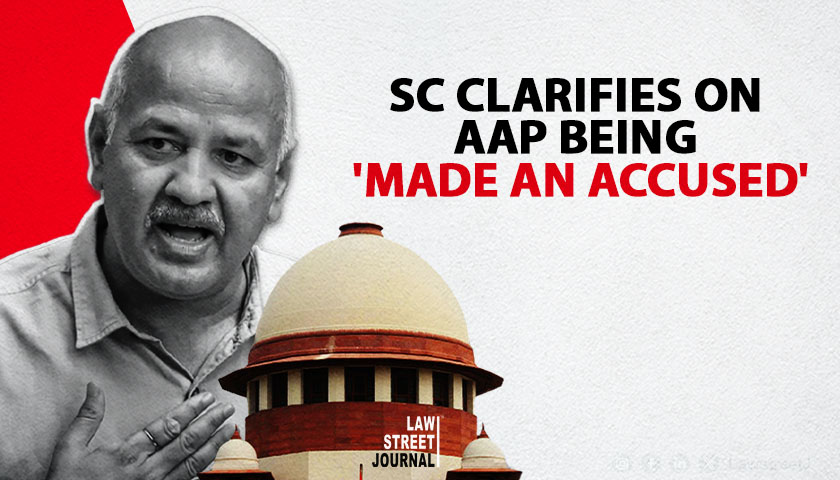NEW DELHI: The Supreme Court on Thursday said its query to Enforcement Directorate on making the AAP an 'accused' in the Delhi liquor policy scam case, was just a legal question and "not to implicate any political party".
Hearing the bail plea of former Deputy Chief Minister, a bench of Justices Sanjiv Khanna and S V N Bhatti also posed a series of questions to Additional Solicitor General S V Raju as to where the money trail is and the agency can't solely rely upon the statement of approver.
"You have to establish a chain. The money has to flow from the liquor lobby to the person. We agree with you that it's difficult to establish the chain because everything is done under cover. But that's where your competence comes in," the bench asked Raju.
"Where is the proof? Dinesh Arora himself is the recipient. Where is the evidence? Except for statement of Dinesh Arora is there any other evidence," the bench also asked.
The bench also asked the agency that it has taken two figures Rs 100 crores and Rs 30 crores. It said the question was who paid them (the accused) this as there can be so many people paying the money, who may not necessarily connected to liquor.
The bench also said no government can continue without any pressure group as lobbying will always be there, though bribes can not be accepted.
"We understand that there is a policy change. Everyone will support policies which are good for business. Pressure groups are always there. Policy changes even if wrong without money consideration will not matter. It is the money part which makes it an offence," the bench said.
The court scheduled the matter for further hearing on October 12, 2023.
Earlier, the court clarified its position as senior advocate A M Singhvi, on behalf of former Delhi Deputy CM Manish Sisodia, submitted that the question why the party was not made an accused was portrayed by news outlets, as the court wanted Aam Aadmi Party to be made an accused.
This is the headline, court asks ED why AAP is not an accused and today in the morning all the channels are carrying that ED has indicated that it wants to make AAP an accused, Singhvi said.
The bench, however, said, We ask questions, we want answers because when he showed us the chart there was a name..number two, we dont get influenced by the media.
Singhvi said it is in the news that they are making AAP an accused based apparently on the courts comment.
The bench said it was not the court's comment, rather it was a question.
Raju, on behalf of the ED and CBI, said, I was today asked by the media. I said that if there is evidence, we will not spare anybody, and if there is no evidence, we will not harass anybody, that is the statement which I made.
Singhvi cited newspapers stories saying court asks why AAP was not made an accused and stressed that court put up a query but there was utter distortion of that query.
With regard to merits, Singhvi said, today the person who has good roots in society, no flight risk- he has been in jail for eight months. There are clear loopholes, and he has a good chance of acquittal, the counsel said.
Singhvi concluded his arguments.
Before Raju proceeded to put forth arguments, the bench said it wanted to clarify that its question made on October 4 was not to implicate anyone.
The bench said suppose as per the prosecution, if A is not being prosecuted can B or C be prosecuted? In that context the question was posed as a legal question.
The bench asked if the allegation that the excise policy was manipulated for monopolisation and cartelisation, was about wholesale trade, not retail sale.
Raju submitted that they are not challenging the policy decision. The bench said but the agency says that policy decision was motivated for personal benefits, so will it not mean that you're challenging the policy decision?
Raju said the policy was framed in a manner to benefit the wholesalers.
"I will show how it was framed and what was the role of Sisodia," Raju said, adding they had a particular policy in mind and they created a facade to make it what they wanted, and they did not want the old policy.
The law officer said to change the policy they got the Dhawan committee report but it wasn't what they wanted, so they invited objections and suggestions. In those objections we see the role of the petitioner, he added.
Raju said they said that everyone who gives Rs 5 crores will be eligible, and in that manner, they could pick and choose who they wanted, and they wanted particular persons to be the wholesalers and so they modified the policy.
On October 4, 2023, the Supreme Court had asked the Enforcement Directorate why the political party, which is alleged to be a beneficiary, is not made an accused in the case under the Prevention of Money Laundering Act.














